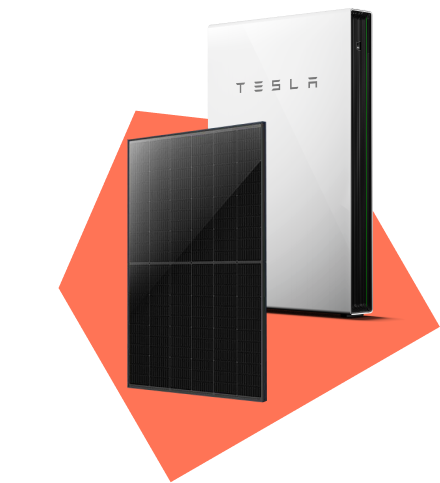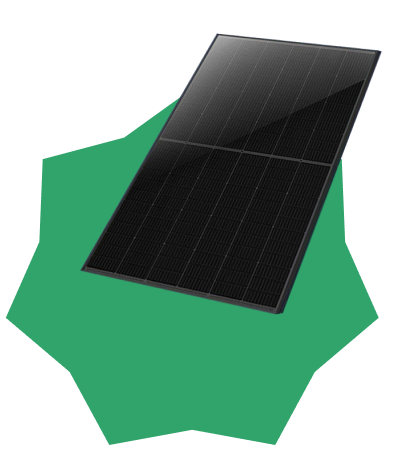Reduce your monthly electricity bills with solar panels and battery storage
It’s the perfect time to embrace green energy with our solar and storage finance options, 10.9% APR* from 5 years up to 15 years. Choose your deposit value to pay upfront, then pay nothing until after your system is installed
At egg, we’ve been powering the change to green energy for our happy customers for over 10 years. We’re on-hand to help you every step of the way; from designing solutions that work for your needs, to seamless installation of your solar panels and battery storage.
*Finance is subject to eligibility, affordability, and terms and conditions. Representative Example: Total price £10,955.00, Deposit £0.00, Total amount borrowed £10,955.00, Monthly Repayment £150.29, Total Amount Payable £18,034.28, Total Interest £7,079.29, Term of agreement 10 years/120 months at 10.9% APR Representative fixed.
Savings and environmental benefits depend on usage, installation, and energy tariffs. Actual results may vary.

Solar & Storage
Save your solar for later
Store cheap off-peak energy
Monitor your savings on your app
Protect yourself from power-cuts
Sizes to suit you from 5.18kWh to 20.8kWh
Industry leading brands including Tesla
10-year product warranty

Solar Only
Super Sunny or Shade Optimised
Custom designed solutions if you have full sunlight or shading on your roof
Sleek all black panel design
Industry leading performance panels & warranties
Monitor your savings on your app
How it works
Solar panel solutions to suit your home
8 solar panel installation
Generate up to 3,306kWh each year with 8 solar panels installed on your roof.
10 solar panel installation
Generate up to 4,133kWh each year with 10 solar panels installed on your roof.
16 solar panel installation
Generate up to 6,612kWh each year with 16 solar panels installed on your roof.
Why egg?
Switching to solar panels is exciting - and we like to keep it that way. From our sales team to your dedicated project coordinator, we make stress-free solar a reality by keeping things simple. Whether its Solar panels or Solar panel battery storage our expert team are here to help.
Best-in-class products
We only use products that are tried, tested, effective and reliable. We tailor each solar panel system to your home (and budget). We offer shade optimised options and home batteries ranging from 3kWh to 13.5kWh.
With you every step of the way
From enquiry to solar panel installation (and even after that!) we’re with you every step of the way to make sure your journey to clean energy is as hassle-free as possible.
Stress-free installation
From scaffolding to the installation itself, you don't need to do a thing. After the average 4-day installation, all you'll be doing is immediately reaping the benefits from your new solar panel and battery storage system.
Peace of mind
Imagine never needing to worry about energy bills. By installing solar panels and battery storage, you protect yourself against unpredictable electricity prices by generating your own clean energy at home.
You're in control
Monitor and manage your electricity generation and usage through the app, as well as schedule off-peak times to store energy from the grid when it’s at its cheapest.
Charge your electric car
If you've already made the switch to an electric car, you can charge it with the power from your solar panels, if you have a compatible EV charger installed at home. Now that's driving on sunshine. ☀️
Award winning products and great value green energy solutions. Easy as ABC.







Keep up with the current
Sign-up to our newsletter to receive all the latest news, advice and content as well as unmissable offers and promotions.


Save money, and the planet while you’re at it
Simple, clean energy: Cut your carbon footprint by powering your home with renewable solar energy
Day and night: Add a battery storage to your solar panel system and use solar electricity even at night
Find the right system
Ready to take the first step to making your house into a green home? Enquire about a home solar and battery storage system with Egg today.

What our customers say
Questions about solar?
Is solar suitable for my home?
Even though every home is a little bit different, most homes in the UK are suitable to install and benefit from solar. It’s the perfect choice if you're looking to reduce your energy bills and do your bit for the environment. The main things to watch out for are obstacles (skylights or dormer windows), too much shading, not enough roof space and poor roof condition. Our team of experts is on hand to use satellite images to talk these things through with you as part of the process here at Egg.
Do solar panels need direct sunlight?
Solar panels are most efficient when they receive direct sunlight. However, they can still produce electricity on cloudy or overcast days and even in indirect or diffuse sunlight (luckily for us in the UK).
Do solar panels work in winter?
In short, Yes! Solar panel systems continue to generate electricity during the winter months, although their efficiency may be reduced compared to the rest of the year due a few factors, mainly the reduced number of daylight hours and a change in the angle of the sun.
How long do solar panels last?
Solar panels are built to endure and are designed for a long and productive life. On average, you can expect your solar panels to keep producing clean, green energy for an impressive 25 to 30 years. Some may even continue working effectively for 40 years or more! So, if you're pondering the benefits of solar energy, rest assured that your investment will continue to shine for many years to come.
What is the best direction for solar panels?
In the UK, the best direction for solar panels is south-facing. Solar panels installed on a south-facing roof will receive the most sunlight throughout the day, maximising energy production. If you don't have a south-facing roof though, all is not lost, solar panels are still effective even if they don't face south. Our team of experts can help you understand how much you could generate if you have an East, West or North facing roof - you might be surprised!!
Do I need planning permission for solar panels?
Most installations of solar panels are considered to be a 'Permitted Development' and therefore don't require planning permission. However, you should check with your local planning authority if you live in a:
• conservation area
• area of outstanding natural beauty
• national park
• listed building
How soon can I get solar installed?
We have installation dates available within 2 weeks.
Questions about storage?
Where do you get your calculations from?
All our numbers come from modelling using standard guidance and calculations from MCS embedded into our design software, OpenSolar.
Design Assumptions:
1) You have a south-facing home that is not shaded and is sloped at 40 degrees.
2) You have a standard roof type with 2 storeys
3) You're home all day with an annual electricity consumption of 4,000 kWh
4) Energy calculation assumptions: Our calculations are based on a customer switching from the average UK energy price cap unit rates to the combination of Octopus Go + Outgoing Lite available in March 2024: 49p/day standing charge, 30p/kWh peak time import (4am - midnight), 9p/kWh off-peak rate (midnight - 4am), 8p/kWh export tariff. We've called this tariff the egg tariff for the purpose of using this OpenSolar software. We assume an annual energy inflation of 7%.
5) Our battery charging pattern has been set up to maximise savings: this means charging during off peak cheaper times, and when your system is generating.
6) System performance assumptions: System Total losses: 0%, Inverter losses: 0%, Optimizer losses: 0%, Shading losses: 0%, Performance Adjustment: 0%, Output Calculator: MCS. Panel Orientations: 16 panels with Azimuth 180 and Slope 40.
What battery storage options are available?
We offer a range of home batteries with storage capacity from 3kWh to 13.5kWh. To make sure you have plenty of storage capacity, to collect any excess solar energy generated, to use later when you need it (even when the sun has gone down).
I’m thinking of getting solar panels, should I get a battery too?
A home battery is a great way to ensure that you store any excess energy you generate from your solar panels to use later in the day when you need it – for example, in the evening when the sun has gone down. Especially if you’re not using as much energy during the day when your solar panels are generating energy, a battery makes sure you don’t lose out on that hard earned green energy – as without a battery, if you don’t use your solar energy it gets lost to the electricity grid. This means you’d instead have to rely on more expensive, less green energy from energy suppliers instead.
Also, installing a battery at the same time as your new solar panels means your battery qualifies for the same VAT rate as solar (instead of 20%) – so getting them together gives you an extra smart saving!
How can I monitor how much energy my battery is storing?
All of our home battery options come with an app which allows you to monitor the performance of your solar panel and battery storage system, including a live view of how power is moving between your solar panels, your battery, and your home.
Should I get a battery if I don’t have solar panels?
You absolutely can – but you should consider the benefit of doing so, which is significantly less if you don’t have solar panels. It is possible to sign up to a “time of use” tariff from your energy supplier (e.g. Economy 7) which would allow you to charge up with cheaper electricity overnight to use during the day for a modest saving, but with energy prices constantly changing we advise you give it some real thought first.
How does battery storage work with solar?
Battery storage technologies are a great way to maximise the benefits of any solar you have installed. They allow you to utilise the power generated by your solar panels by storing the power for later use.
How does solar battery storage work?
Simply put, battery storage is a smart way to maximise your return on investment from a solar panel system and ensure you utilise the power generated from your solar panels. A home battery stores any extra solar you generate so that you can use it later, rather than exporting to the grid – even after the sun goes down.
Are solar battery storage worth it?
With the addition of a home battery to the system, we would expect solar self-consumption to increase from 50% to up to 90%, saving you as much as 90% on your energy bills.
What’s more, you can even store energy from the grid during the night when energy is cheaper by being less in demand – and, with smart scheduling, monitor, manage and schedule its charge.
Can you add battery storage to existing solar panels?
It isn’t necessary to have your battery installed at the same time as your solar panels but there are benefits.
If they are installed at the same time, you don’t pay VAT on the battery as it is labelled as a solar installation.
It’s also worth mentioning that depending on the approval required for your solar system, it may be easier to gain approval for solar and a battery at the same time, rather than having to submit a second application with any wait times later down the line.
How big are solar storage batteries?
We offer a range of home batteries to meet your energy (and budget) requirements, ranging from 3kWh to 13.5kWh capacity. Speak to one of our solar experts today about which one is right for you.
In terms of dimensions, 773 x 1150 x 147 (mm), and be aware batteries can be extremely heavy, weighing up to 125KG.
How long do Solar storage batteries last?
Our home batteries come with a 10-year warranty to make sure you can get the most out of your battery and home solar system.
How much are Solar panel storage batteries?
Our battery storage costs depend on the type of system you are having installed, if you’re having solar installed at the same time, the amount of storage you required and many other factors. For an accurate quote, we can discuss this with you in a free virtual consultation, to ensure the prices are accurate for your specific needs.



